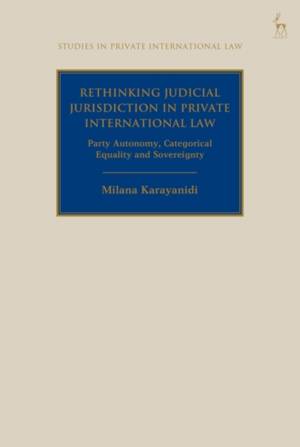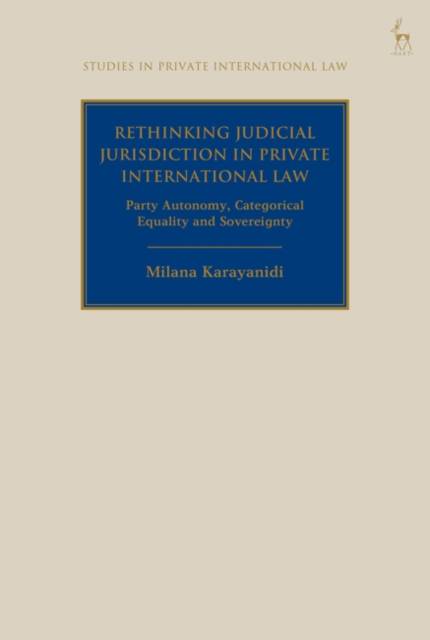
Bedankt voor het vertrouwen het afgelopen jaar! Om jou te bedanken bieden we GRATIS verzending (in België) aan op alles gedurende de hele maand januari.
- Afhalen na 1 uur in een winkel met voorraad
- In januari gratis thuislevering in België
- Ruim aanbod met 7 miljoen producten
Bedankt voor het vertrouwen het afgelopen jaar! Om jou te bedanken bieden we GRATIS verzending (in België) aan op alles gedurende de hele maand januari.
- Afhalen na 1 uur in een winkel met voorraad
- In januari gratis thuislevering in België
- Ruim aanbod met 7 miljoen producten
Zoeken
Rethinking Judicial Jurisdiction in Private International Law
Party Autonomy, Categorical Equality and Sovereignty
Milana Karayanidi
€ 220,45
+ 440 punten
Omschrijving
This book explores the theory and practice of judicial jurisdiction within the field of private international law. It offers a revised look at values justifying the power of courts to hear and decide cross-border disputes, and demonstrates that a re-conceptualisation of jurisdiction is needed. Rather than deriving from territorial power of states, jurisdiction in civil and commercial cross-border matters ought to be driven by party autonomy. This autonomy can be limited by certain considerations of equality and critical state sovereign interests.
The book applies this normative view to the existing rules of jurisdiction in the European Union and the Russian Federation. These regimes are chosen due to their unique positions towards values in private international law and contrasting societal norms that generate and accommodate these values. Notwithstanding disparate cultural and political ideas, these regimes reveal a surprising level of consistency when it comes to enforcement of party autonomy. There is, nevertheless, room for improvement. The book demonstrates to scholars, policy makers and lawmakers that jurisdiction should be re-centred around the interests of private actors, and proposes ways to improve the current rules.
The book applies this normative view to the existing rules of jurisdiction in the European Union and the Russian Federation. These regimes are chosen due to their unique positions towards values in private international law and contrasting societal norms that generate and accommodate these values. Notwithstanding disparate cultural and political ideas, these regimes reveal a surprising level of consistency when it comes to enforcement of party autonomy. There is, nevertheless, room for improvement. The book demonstrates to scholars, policy makers and lawmakers that jurisdiction should be re-centred around the interests of private actors, and proposes ways to improve the current rules.
Specificaties
Betrokkenen
- Auteur(s):
- Uitgeverij:
Inhoud
- Aantal bladzijden:
- 272
- Taal:
- Engels
- Reeks:
Eigenschappen
- Productcode (EAN):
- 9781509924776
- Verschijningsdatum:
- 30/04/2020
- Uitvoering:
- Hardcover
- Formaat:
- Genaaid
- Afmetingen:
- 156 mm x 234 mm
- Gewicht:
- 557 g

Alleen bij Standaard Boekhandel
+ 440 punten op je klantenkaart van Standaard Boekhandel
Beoordelingen
We publiceren alleen reviews die voldoen aan de voorwaarden voor reviews. Bekijk onze voorwaarden voor reviews.









